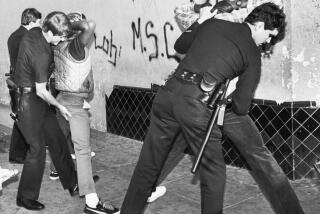Mayor Becomes a Fan of Juvenile Court That Speeds Cases
Mayor Richard Riordan, who has long argued for punishing juvenile offenders swiftly to deter them from committing crimes, visited a novel project Tuesday that has dramatically cut down the amount of time needed to bring youngsters to trial on minor offenses.
The project, established to handle traffic, truancy and minor drug violations, reports an overwhelming success rate, and it left the initially skeptical mayor promising to seek expansion of the program.
“I’ve been critical of all aspects of the criminal justice system,” Riordan said after observing a number of young people questioned by a judicial referee and sentenced to counseling or other penalties after admitting their guilt to minor offenses. “I’ve had a real eye-opener here today.”
Riordan said he would urge Sacramento legislators to boost funding for the program so that it can reach more children. The program, known by the slightly misleading name of Juvenile Traffic Court, processes cases against children far faster than traditional courts and imposes all manner of unorthodox sentences.
In part, the court works quickly because it does not allow children to be accompanied by lawyers--an aspect that appealed to Riordan. But it does require them to be escorted by a parent or guardian--an aspect that seems to make the session even more uncomfortable for them.
Court officials said most juvenile cases take nine months to work their way to trial, while 45 days is the average for the informal court.
During the session that Riordan observed, youngsters were called before Referee Luis Francisco Soliz, who sternly informed them of their rights and grilled them about their offenses.
To one 14-year-old boy caught truant because he skipped school to cut sugar cane in a vacant lot, Soliz intoned: “This is your future. . . . You’ve got a responsibility to your mother, yourself and your community.”
The young boy hung his head and mumbled a response, but then smiled thinly after the judge agreed to waive his $170 fine if the boy completes summer school with a C average or better and returns to him later this year with proof of a perfect attendance record. His mother smiled gratefully, and shook the mayor’s hand as he left.
Although the name implies that only traffic offenders come through the court, that is not the case. Only juveniles charged with infractions may use the system, but those infractions can include curfew violations, truancy, minor drug offenses or traffic violations.
About 97% plead guilty, and, according to the court, 90% complete community service, counseling or other programs successfully, allowing them to wipe their offense from their official record. The system also works much faster than traditional court, largely because opposing lawyers are absent from the process, project officials say.
As Riordan and several aides watched, another young truant, this one a 14-year-old girl, admitted her guilt in cutting school. As with all participants in the program, she appeared before the robed referee with a parent--in this case, her mother. As with many, she appeared sheepish when confronted with the police report of her alleged violation.
Noting that she had been caught skipping school Friday, May 8, Soliz asked her why she’d missed class. “I wanted to go out on Friday,” she said quietly. “I didn’t want to go to class.”
Soliz was unyielding. “Your job,” he said to the young girl, “is to get an education.”
Her mother, who said she works in law enforcement, explained that the girl had been having a problem in recent months with a friend who was “a bad influence,” but then added that she had enrolled her daughter in an LAPD magnet school. According to her mother, the young girl is aiming to become a police officer.
Turning toward Riordan, who was sitting at the back of the makeshift courtroom, the mother gestured at her daughter.
“I’m sure you’ll meet her again at the [Police] Academy,” the mother said as her daughter blushed.
“You’ll make a good police officer,” Riordan told the girl. “Keep your head up.”
Riordan has championed informal courts before, lobbying for them in 1996 and 1997. After Tuesday’s session, he urged an aide to explore what might be done to expand them still further.
So far this year, the informal Juvenile Traffic Court in Los Angeles has cleared more than 150,000 cases. On Monday alone, referees in the court’s Central Division expected to hear 200 cases, averaging just a few minutes apiece.
More to Read
Sign up for Essential California
The most important California stories and recommendations in your inbox every morning.
You may occasionally receive promotional content from the Los Angeles Times.











